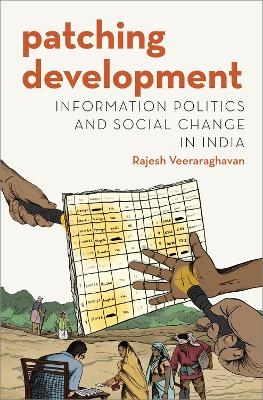
Patching Development
Information Politics and Social Change in India
Seiten
2022
Oxford University Press Inc (Verlag)
978-0-19-756781-4 (ISBN)
Oxford University Press Inc (Verlag)
978-0-19-756781-4 (ISBN)
Diving into an original and unusually positive case study from India, Patching Development shows how development programs can be designed to work.
How can development programs deliver benefits to marginalized citizens in ways that expand their rights and freedoms? Political will and good policy design are critical but often insufficient due to resistance from entrenched local power systems. In Patching Development, Rajesh Veeraraghavan presents an ethnography of one of the largest development programs in the world, the Indian National Rural Employment Guarantee Act (NREGA), and examines NREGA's implementation in the South Indian state of Andhra Pradesh. He finds that the local system of power is extremely difficult to transform, not because of inertia, but because of coercive counter strategy from actors at the last mile and their ability to exploit information asymmetries. Upper-level NREGA bureaucrats in Andhra Pradesh do not possess the capacity to change the power axis through direct confrontation with local elites, but instead have relied on a continuous series of responses that react to local implementation and information, a process of patching development. "Patching development" is a top-down, fine-grained, iterative socio-technical process that makes local information about implementation visible through technology and enlists participation from marginalized citizens through social audits. These processes are neither neat nor orderly and have led to a contentious sphere where the exercise of power over documents, institutions and technology is intricate, fluid and highly situated. A highly original account with global significance, this book casts new light on the challenges and benefits of using information and technology in novel ways to implement development programs.
How can development programs deliver benefits to marginalized citizens in ways that expand their rights and freedoms? Political will and good policy design are critical but often insufficient due to resistance from entrenched local power systems. In Patching Development, Rajesh Veeraraghavan presents an ethnography of one of the largest development programs in the world, the Indian National Rural Employment Guarantee Act (NREGA), and examines NREGA's implementation in the South Indian state of Andhra Pradesh. He finds that the local system of power is extremely difficult to transform, not because of inertia, but because of coercive counter strategy from actors at the last mile and their ability to exploit information asymmetries. Upper-level NREGA bureaucrats in Andhra Pradesh do not possess the capacity to change the power axis through direct confrontation with local elites, but instead have relied on a continuous series of responses that react to local implementation and information, a process of patching development. "Patching development" is a top-down, fine-grained, iterative socio-technical process that makes local information about implementation visible through technology and enlists participation from marginalized citizens through social audits. These processes are neither neat nor orderly and have led to a contentious sphere where the exercise of power over documents, institutions and technology is intricate, fluid and highly situated. A highly original account with global significance, this book casts new light on the challenges and benefits of using information and technology in novel ways to implement development programs.
Rajesh Veeraraghavan is an Assistant Professor of Science Technology and International Affairs (STIA) Program at Georgetown University's School of Foreign Service.
Acknowledgments
Map
Abbreviations
Chapter 1. Introduction
Chapter 2. The Genesis of Rights-Based Governance
Chapter 3. Patching Technologies of Control
Chapter 4. Patching Institutions
Chapter 5. Public Meetings at the Last Mile
Chapter 6. Reading and Writing the State Records
Chapter 7. Caste, Class, and Audits
Chapter 8. Conclusion: Patching the Power at the Last Mile
Appendix 1. Methodology: Using Ethnography to Study Political Economy of Information
Appendix 2. Explanatory Note on Comparing NREGA Performance across States
| Erscheinungsdatum | 19.11.2021 |
|---|---|
| Reihe/Serie | Modern South Asia |
| Verlagsort | New York |
| Sprache | englisch |
| Maße | 241 x 159 mm |
| Gewicht | 494 g |
| Themenwelt | Sozialwissenschaften ► Politik / Verwaltung ► Vergleichende Politikwissenschaften |
| Sozialwissenschaften ► Soziologie ► Spezielle Soziologien | |
| Wirtschaft ► Volkswirtschaftslehre ► Wirtschaftspolitik | |
| ISBN-10 | 0-19-756781-9 / 0197567819 |
| ISBN-13 | 978-0-19-756781-4 / 9780197567814 |
| Zustand | Neuware |
| Haben Sie eine Frage zum Produkt? |
Mehr entdecken
aus dem Bereich
aus dem Bereich
Geschichte, Parteistruktur, Radikalisierung
Buch | Softcover (2024)
UTB (Verlag)
CHF 38,95


